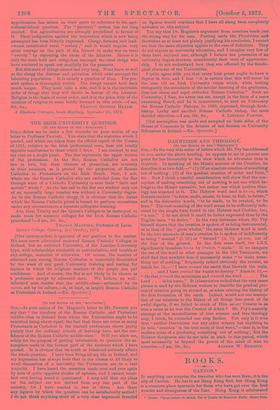DARWINISM AND THEOLOGY.
[TO TEE EDITOR OF THE SPECTATOR."] SIR,—In the very able series of letters which Mr. Fry has addressed' to you under the above heading, he appears to me to present one point far less favourably to the view which he advocates than is. required. In speaking of the Mosaic account of the Creation, he describes it as two-fold,—" (1) Of an absolute creation of something out of nothing ; (2) of the gradual creation of order and form," &c. Now I think a careful consideration will show that the con- ception of making something out of nothing is not one which be- longs to the Mosaic narrative, but rather one which modern theo- logy has attached to it. The Hebrew word used is ba-ra, whicIr Genesis renders "to form, make, create, to bear, to feed, to fatten,'" and in the derivative words, "to be made, to be created, to be born." The root-meaning of the word seems to be sufficiently indi- cated by the simple form found in the Hebrew and Chaldee, bar, "a son." I do not think it could be better expressed than by the English term "to derive." In the very instances where Mr. Fry. himself shows that the creation is spoken of as being instrumental, as in that of the "great whales," the same Hebrew word is used. In the two accounts of man's creation he is spoken of indifferently as being " created " (i. 27) or " formed " (ii. 7), ya-tsar, out of the dust of the ground. In the first verse itself, the LXX significantly translate ba-ra by broina, "made." If we compare the use of the word in other passages in the Old Testament, we, shall find that nowhere does it necessarily mean "to make some- thing out of nothing," frequently indeed obviously the reverse, as Isaiah Lim. 16,—" I have created the smith that bloweth the coals..
and I have created the waster to destroy." Amos iv. 13,— " He thatformeth the mountains and createth the wind The Lord . . . is his name." It is instructive to find that the very same phrase is used by the Hebrew writers to describe the gradual pro- cess of creation going on around us, as when relating the history of the first formation of the earth. Indeed, would not our concep- tion of our relations to the Maker of all things lose much of its awful dignity, if we failed to think of Him as our Creator in as true a sense as he was the Creator of Adam ? Mr. Fry's masterly attempt at the reconciliation of true science and true theology may, I think, be extended one step farther. Not only is it true that "neither Darwinism nor any other science has anything to- do with ' creation ' in the true sense of that word,"—that is, in the modern sense of a producing something out of nothing ; but the- Hebrew Scriptures also do not take us back to this period, whiclip must necessarily be beyond the power of the mind of man to.


































 Previous page
Previous page